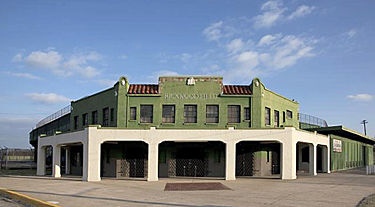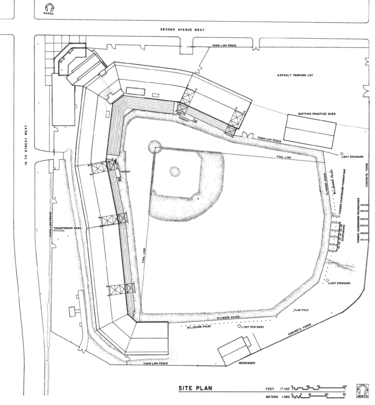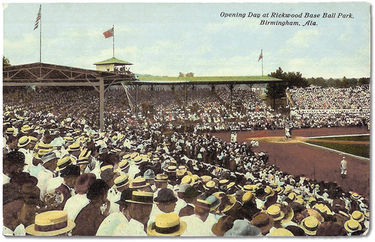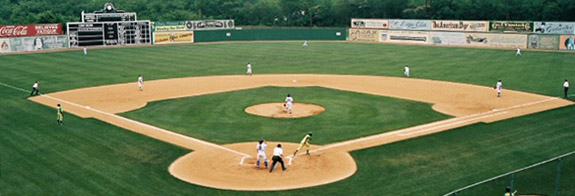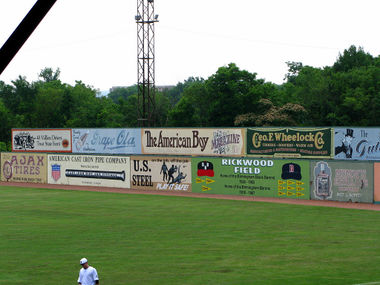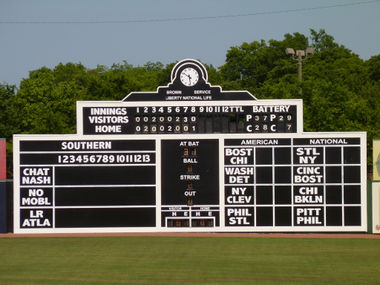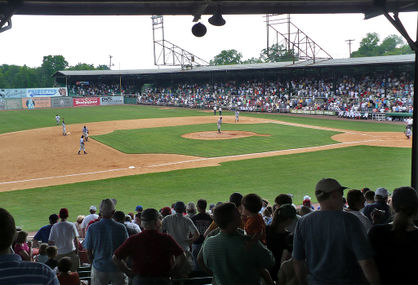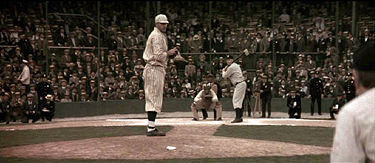Rickwood Field: Difference between revisions
| (37 intermediate revisions by 2 users not shown) | |||
| Line 1: | Line 1: | ||
[[Image:Rickwood Field entrance 2010.jpg|right|thumb| | [[Image:Rickwood Field entrance 2010.jpg|right|thumb|375px|Entrance to Rickwood Field in 2010]] | ||
[[Image:Rickwood site plan.png|right|thumb| | [[Image:Rickwood site plan.png|right|thumb|375px|A plan of Rickwood Field (HABS 1993)]] | ||
'''Rickwood Field''', located at 1137 [[2nd Avenue West]], at the corner of [[12th Street West]] in [[West | '''Rickwood Field''', located at 1137 [[2nd Avenue West]], at the corner of [[12th Street West]] in [[Rising-West Princeton]], is the oldest surviving professional baseball park in the United States. It was built for the [[Birmingham Barons]] in [[1910]] by industrialist and team-owner [[Rick Woodward]] and served as the home park for the Barons and for the [[Birmingham Black Barons]] of the Negro Leagues. The Barons moved their home games to the [[Hoover Metropolitan Stadium]] in [[1987]]. Since then, Rickwood Field has been preserved and is undergoing continual restoration. A museum to house the [[Negro and Southern Leagues Hall of Fame]] has been proposed for a site next door to the park. | ||
==History== | ==History== | ||
| Line 11: | Line 11: | ||
Opening day on [[August 18]], [[1910]], was celebrated by businesses closing all over town to allow fans to fill the park for the first pitch at 3:30 P.M. Over 10,000 people attended that first game in which the Barons defeated the visiting Montgomery Climbers 3-2. Throughout the first half of the [[20th century]] Rickwood Field hosted sellout crowds for the Barons and the Black Barons who played on alternate weekends. | Opening day on [[August 18]], [[1910]], was celebrated by businesses closing all over town to allow fans to fill the park for the first pitch at 3:30 P.M. Over 10,000 people attended that first game in which the Barons defeated the visiting Montgomery Climbers 3-2. Throughout the first half of the [[20th century]] Rickwood Field hosted sellout crowds for the Barons and the Black Barons who played on alternate weekends. | ||
In [[1912]] a spring tornado tore through the field, pulling up the outfield fence. Two years later Woodward felt the need to have electric fans installed in the grandstands for the comfort of the crowd. | In [[1912]] a spring tornado tore through the field, pulling up the outfield fence. Two years later Woodward felt the need to have electric fans installed in the grandstands for the comfort of the crowd. On [[February 1]], [[1913]] the stadium hosted a soccer match between "All-Star" teams from Atlanta, Georgia and the [[Birmingham District]]. Birmingham won 4-0. On [[August 18]], [[1915]] Rickwood hosted a "Suffrage Day" 1-inning game between all-female baseball teams from [[Birmingham]] and [[Bessemer]] in support of the [[Alabama Equal Suffrage Association]]. [[Carlton Molesworth]] served as umpire. | ||
During the [[1920s]] Rickwood Field also hosted [[college football]] games. In [[1921]] the outfield fence was damaged in a tornado and quickly rebuilt. In [[1924]]-[[1927]] the infield bleachers were covered with a steel-framed roof designed by [[Denham, VanKeuren & Denham]], Architects of Birmingham. Shortly after, In [[1928]] a new Mission style entry structure with offices was built to the designs of [[Paul Wright & Co.]], Engineers of Birmingham. A new concrete outfield wall replaced the original fence. | During the [[1920s]] Rickwood Field also hosted [[college football]] games. In [[1921]] the outfield fence was damaged in a tornado and quickly rebuilt. In October [[1924]] the [[Robert E. Lee Klan No. 1]] hosted a rally which filled the grandstands with more than 23,000 people. Attendees saw an effigy of Senator [[Oscar Underwood]] buried under the platform at center field. | ||
In [[1924]]-[[1927]] the infield bleachers were covered with a steel-framed roof designed by [[Denham, VanKeuren & Denham]], Architects of Birmingham. Shortly after, In [[1928]] a new Mission style entry structure with offices was built to the designs of [[Paul Wright & Co.]], Engineers of Birmingham. A new concrete outfield wall replaced the original fence. | |||
In [[1931]] in the first game of the [[Dixie Series]] championship, Birmingham's 43-year-old [[Ray Caldwell]] outpitched 22-year-old [[Dizzy Dean]], who had guaranteed a win. The Barons won the series 4 games to 3. In [[1936]], at the suggestion of Woodward's son-in-law [[Jim Burt]], four monumental steel-frame light towers designed and fabricated by the Truscon Steel Company of Youngstown, Ohio were erected, allowing for night games. The gamble paid off with a surge in attendance. | In [[1931]] in the first game of the [[Dixie Series]] championship, Birmingham's 43-year-old [[Ray Caldwell]] outpitched 22-year-old [[Dizzy Dean]], who had guaranteed a win. The Barons won the series 4 games to 3. In [[1936]], at the suggestion of Woodward's son-in-law [[Jim Burt]], four monumental steel-frame light towers designed and fabricated by the Truscon Steel Company of Youngstown, Ohio were erected, allowing for night games. The gamble paid off with a surge in attendance. | ||
| Line 19: | Line 21: | ||
On [[February 7]], [[1938]], Woodward sold the park to [[Ed Norton]], a local businessman, for $175,000. In [[1940]] Norton sold it to the Cincinnati Reds. Under their tenure, new outfield fences were built inside the original walls to reduce the field dimensions for the [[1941 Birmingham Barons|1941 season]]. | On [[February 7]], [[1938]], Woodward sold the park to [[Ed Norton]], a local businessman, for $175,000. In [[1940]] Norton sold it to the Cincinnati Reds. Under their tenure, new outfield fences were built inside the original walls to reduce the field dimensions for the [[1941 Birmingham Barons|1941 season]]. | ||
Rickwood hosted game 7 of the [[1943 Negro World Series]] between the [[1943 Birmingham Black Barons|Black Barons]] and Homestead Grays. 10,000 fans packed the stands to see what turned into a pitchers' duel between [[Johnny Markham]] and Roy Partlow. [[Ed Steele]] drove in [[Leonard Lindsay]] in the 11th to tie the series at 3-3. The Grays went on to win the series in Game 8 at the Crampton Bowl in Montgomery two days later. | |||
==Closure== | Birmingham restaurateur [[Gus Jebeles (Barons owner)|Gus Jebeles]] purchased the Barons and their home park in [[1944]]. The ballpark hosted the Ringling Brothers & Barnum and Bailey Circus in October [[1945]]. A ladies' rest room was added and the outfield fence reduced again in [[1948]]. In [[1949]] ownership changed hands again, going to a partnership of [[Al DeMent]], [[Al Belcher]], and [[Rufus Lackey]]. They added a small '''Dugout Restaurant''' in the entrance building in [[1950]] and installed additional box seats, necessitating the relocations of the dugouts farther down the baselines. In [[1958]] Belcher gained a majority share and control of the park. | ||
Following the [[1961 Birmingham Barons|1961 season]], the Southern Association folded and, for the first time in 52 years, there would be no professional baseball at Rickwood. | |||
===Closure=== | |||
Following the [[1961 Birmingham Barons|1961 season]], the Southern Association folded and, for the first time in 52 years, there would be no professional baseball at Rickwood. A proposal was floated for the [[City of Birmingham]] to purchase the facility and adapt it for use as a high school football stadium, but that idea was not pursued. | |||
Instead, Belcher bought up the remaining stock in the stadium. Later that year he teamed up with Kansas City A's owner [[Charlie Finley]] to bring the Barons back for the [[1964 Birmingham Barons|1964 season]] as a AA team in the newly-formed [[Southern League]]. Belcher had the stadium refurbished and painted in the new team colors of green and gold. Finley served as honorary bat boy for the first three innings of the Barons' opening night loss to the Asheville Tourists. | |||
In [[1964]], General Manager [[Glynn West]] purchased 1000 wooden seats from New York's Polo Grounds and installed them at the park. | |||
After declining attendance in the [[1965 Birmingham Barons|1965 season]], Belcher suspended play for the [[1966 Birmingham Barons|1966 season]], and Finley transferred his AA franchise to Mobile. Belcher put the park up for sale for $500,000 and threatened to demolish it for the salvage value. In [[1966]] he reached an agreement with the City of Birmingham, retaining a lease for the remainder of that year. | After declining attendance in the [[1965 Birmingham Barons|1965 season]], Belcher suspended play for the [[1966 Birmingham Barons|1966 season]], and Finley transferred his AA franchise to Mobile. Belcher put the park up for sale for $500,000 and threatened to demolish it for the salvage value. In [[1966]] he reached an agreement with the City of Birmingham, retaining a lease for the remainder of that year. | ||
Later in [[1966]], the lease was transferred to Finley, who brought Kansas City's AA farm team back to Birmingham for the [[1967 Birmingham A's|1967]] season, dubbed the "Birmingham A's". | Later in [[1966]], the lease was transferred to Finley, who brought Kansas City's AA farm team back to Birmingham for the [[1967 Birmingham A's|1967]] season, dubbed the "Birmingham A's". That year is also remembered for the day that 14,000 disappointed fans were sent home early when the Atlanta Braves vs. Southern League All-Stars exhibition game was called "on account of tornado." Neighborhood complaints led the Park & Recreation Board to prohibit [[List of concerts at Rickwood Field|rock concerts at the stadium]] in [[1973]]. Nevertheless, Lynyrd Skynyrd headlined a [[July 4]] show at Rickwood in [[1975]]. | ||
After increasingly dismal attendance numbers, the [now] Oakland Athletics ended its affiliation with Birmingham following the [[1975]] season, | After increasingly dismal attendance numbers, the [now] Oakland Athletics ended its affiliation with Birmingham following the [[1975]] season. Except for the abortive 5-game run for the Freedom Baseball League's [[Alabama Barons]] on [[July 2]]-[[July 4|4]], [[1978]], the stadium went six more years without a home team. Between [[1979]] and [[1980]] the wooden seats were replaced with plastic seats in the box areas and metal bleachers under the grandstands. | ||
In [[1981]] [[Art Clarkson]] brought minor league baseball back to Rickwood. | In [[1981]] [[Art Clarkson]] brought minor league baseball back to Rickwood. Clarkson purchased the Detroit Tigers' AA affiliate [[Montgomery Rebels]] in the Southern League and moved them to Birmingham, renaming them the Barons. Clarkson also had a new electronic scoreboard installed at the park. The Barons would change affiliations in [[1985]] to the Chicago White Sox, and would remain in Rickwood until [[1987]]. | ||
In 1987 the Barons moved to the new [[Regions Park|Hoover Metropolitan Stadium]], in the suburb of [[Hoover]]. | In 1987 the Barons moved to the new [[Regions Park|Hoover Metropolitan Stadium]], in the suburb of [[Hoover]]. | ||
<gallery mode="packed" heights="190px"> | |||
Image:Barons Baseball banner.jpg|Overview of the field in 2007. Photograph by [http://www.flickr.com/photos/xabbu/ Joshua Self] | |||
File:Outfield-signage-rickwood-field-2010.jpg|Rickwood Field outfield signage in 2010. Photograph by [https://www.flickr.com/photos/johnnystiletto/ Julia Frost] | |||
File:Rickwood-field-scoreboard-2012.jpg|Rickwood Scoreboard at the [[2012 Rickwood Classic]] | |||
File:Rickwood-diamond-view-from-stands-2010.jpg|Rickwood Diamond at the [[2010 Rickwood Classic]] | |||
</gallery> | |||
== | ===Friends of Rickwood=== | ||
Since [[1992]] the ballpark has been under the care of the [[Friends of Rickwood]] who | Since [[1992]] the ballpark has been under the care of the [[Friends of Rickwood]] who have worked to preserve and restore the facility while also hosting frequent amateur, police and semi-pro games, and opening the gates to frequent visitors who can walk in any day and explore the grandstands or run the basepaths. | ||
In [[1996]], Rickwood Field began hosted the Barons for a "throwback game" in which both teams wear period uniforms. Each [[Rickwood Classic]] has honored a different era in Birmingham baseball history. | |||
[[Image:Cobb still.jpg|thumb|right|375px|Still from "Cobb", with Roger Clemons on the mound portraying Ed Walsh and Tommie Lee Jones as Ty Cobb, about to steal third.]] | [[Image:Cobb still.jpg|thumb|right|375px|Still from "Cobb", with Roger Clemons on the mound portraying Ed Walsh and Tommie Lee Jones as Ty Cobb, about to steal third.]] | ||
Scenes from the films ''[[Cobb]]'' ([[1994]]) | Scenes from the [[List of feature films shot in Birmingham|feature films]] ''[[Cobb]]'' ([[1994]]), ''[[Soul of the Game]]'' ([[1995]]), and ''[[42]]'' ([[2013]]) were filmed at Rickwood Field. Those productions contributed to the recreation of the scoreboard and pressbox, and the addition of 1940s period style advertisements on the outfield fences. Some of those retro-style ads have been sponsored by real Birmingham businesses, including a section sponsored by the descendants of Rick Woodward advertising the long-gone Woodward Iron Co. The outfield signs were designed by Ted Haigh, a Los Angeles-based graphic designer and executed by [[Skidmore Sign Company]] of Birmingham. | ||
By [[2005]], the Friends of Rickwood had spent around $2 million refurbishing the grandstands, pressbox, locker rooms, roof and main entrance to the park. In December [[2007]] Birmingham mayor [[Larry Langford]] said he wanted to begin discussing the creation of a [[Negro and Southern Leagues Hall of Fame]] celebrating the contributions of African-Americans to the sport of baseball. In April [[2009]] he unveiled a proposal for a $7.5 million project that would include construction of the museum, additional renovations to the historic ballpark, and a skywalk connecting the two. City funding for the project was approved in May and contracts with [[Davis Architects]] for the renovations and with [[Exford Architects]] for the museum were approved in July. A ceremonial groundbreaking was held on [[August 12]]. Langford was convicted in federal court on charges of fraud and bribery that October, and work on that project was set aside. | |||
ESPN Classic broadcast a re-enactment of a Negro League game played at Rickwood on [[February 26]], [[2006]]. It featured teams wearing the uniforms of the Bristol Barnstormers and Birmingham Black Barons. | ESPN Classic broadcast a re-enactment of a Negro League game played at Rickwood on [[February 26]], [[2006]]. It featured teams wearing the uniforms of the Bristol Barnstormers and Birmingham Black Barons. | ||
In [[2014]] [[Alagasco]] donated salvaged materials from the demolition of the downtown [[Birmingham Southern Railroad freight depot]] for use in reconstructing the stadium's batting building. Rickwood Field was set to receive $500,000 for facility upgrades from the city's "[[Phase II Bond Projects]]" in [[2016]]. That money was instead used for emergency repairs to the structure. The [[Birmingham City Council]] approved a $1 million no-bid contract for [[J. J. Morley Enterprises]] to perform the repairs in early [[2018]]. | |||
===MLB at Rickwood=== | |||
On [[June 20]], [[2024]] Major League Baseball held the "[[MLB at Rickwood Field|MLB at Rickwood Field: A Tribute to the Negro Leagues]]" regular-season game between the St Louis Cardinals and the San Francisco Giants at the stadium. Major renovations were undertaken to adapt the stadium to meet MLB requirements for player and spectators. The playing field was lowered by more than two feet, with new subsurface drainage and irrigation topped with new natural turf. The dugouts were expanded; the outfield wall was altered; and new netting was installed in front of the stands. | |||
Those improvements allowed the Southern League, part of the MLB's Professional Development League since [[2021]], to resume using the field for the Rickwood Classic, and also made the field more suitable for college baseball. MLB field and stadium consultants reassured preservationists that the ballpark would be kept in its "authentic state as much as possible." | |||
Birmingham's [[Public Athletic, Cultural and Entertainment Facilities Board]] issued $4.5 million in bonds through [[PNC Bank]] to fund renovations at Rickwood Field. The [[City of Birmingham]] appropriated more than $2.5 million toward that project. | |||
[[Trawick Contractors]] was awarded an $553,477 contract for initial repairs to the stadium in June [[2023]]. [[A. G. Gaston Construction]] is expected to perform additional work under contract to Major League Baseball Advanced Media (MLBAM). | |||
The overall price tag for upgrades relating to the MLB at Rickwood game was around $5-6 million. | |||
==References== | ==References== | ||
* Phillips, Bob (1965?) "[http://bplonline.cdmhost.com/u?/p4017coll2,1306 The Grim Wrecker Has His Eyes on Rickwood]" | * Phillips, Bob (1965?) "[http://bplonline.cdmhost.com/u?/p4017coll2,1306 The Grim Wrecker Has His Eyes on Rickwood]" {{BPH}} - via {{BPLDC}} | ||
* Greenhill, Scott (September 27, 1973) "[http://bplonline.cdmhost.com/u?/p4017coll2,1302 Park board bans rock concerts at Rickwood Field]" | * Greenhill, Scott (September 27, 1973) "[http://bplonline.cdmhost.com/u?/p4017coll2,1302 Park board bans rock concerts at Rickwood Field]" {{BPH}} - via {{BPLDC}} | ||
* Benson, Michael (1989). ''Ballparks of North America: A Comprehensive Historical Reference to Grounds, Yards, and Stadiums, 1845-Present''. McFarlands. ISBN 9780899503677 | * Benson, Michael (1989). ''Ballparks of North America: A Comprehensive Historical Reference to Grounds, Yards, and Stadiums, 1845-Present''. McFarlands. ISBN 9780899503677 | ||
* Wainwright, Paige. (Fall 1995) “Rickwood Field: Grand Old Lady of Baseball.” ''Alabama Heritage''. | * Wainwright, Paige. (Fall 1995) “Rickwood Field: Grand Old Lady of Baseball.” ''Alabama Heritage''. | ||
| Line 57: | Line 83: | ||
* [[Ben Cook|Cook, Ben]] (2005). ''Good Wood: A Fan's History of Rickwood Field.'' Birmingham, Alabama: R. Boozer Press. ISBN 0963612832 | * [[Ben Cook|Cook, Ben]] (2005). ''Good Wood: A Fan's History of Rickwood Field.'' Birmingham, Alabama: R. Boozer Press. ISBN 0963612832 | ||
* Caple, Jim (May 11, 2007) "[http://sports.espn.go.com/travel/columns/story?columnist=caple_jim&id=2545695 Caple: Rickwood Field a Nod to an Earlier Era]" ESPN.com | * Caple, Jim (May 11, 2007) "[http://sports.espn.go.com/travel/columns/story?columnist=caple_jim&id=2545695 Caple: Rickwood Field a Nod to an Earlier Era]" ESPN.com | ||
* Bryant, Joseph D. (April 2, 2009) "Birmingham considering museum, restoration at Rickwood Field." | * Bryant, Joseph D. (April 2, 2009) "Birmingham considering museum, restoration at Rickwood Field." {{BN}} | ||
* Bryant, Joseph D. (May 5, 2009) "Birmingham City Council OKs $7.5 million for museum, Rickwood Field improvements." | * Bryant, Joseph D. (May 5, 2009) "Birmingham City Council OKs $7.5 million for museum, Rickwood Field improvements." {{BN}} | ||
* Bryant, Joseph D. (August 14, 2009) "Ceremonial beginning for Rickwood Field renovations." | * Bryant, Joseph D. (August 14, 2009) "Ceremonial beginning for Rickwood Field renovations." {{BN}} | ||
* "[http://en.wikipedia.org/w/index.php?title=Rickwood_Field&oldid=337612254 Rickwood Field]" (January 13, 2010) Wikipedia | * "[http://en.wikipedia.org/w/index.php?title=Rickwood_Field&oldid=337612254 Rickwood Field]" (January 13, 2010) Wikipedia - accessed March 25, 2010 | ||
* {{Barra-2010}} | * {{Barra-2010}} | ||
* Carlton, Bob (August 18, 2010) "Happy Birthday, Rickwood Field! Birmingham's ballpark, America's oldest, hits 100." ''Birmingham | * Carlton, Bob (August 18, 2010) "Happy Birthday, Rickwood Field! Birmingham's ballpark, America's oldest, hits 100." {{BN}} | ||
* Wray, Cheryl (June 1, 2017) "Birmingham promises $500,000 to repair Rickwood Field, return Barons to historic park in 2018." {{BN}} | |||
* Harksen, Lauren (June 14, 2023) "Birmingham City Council approves $500,000 bid for Rickwood Field improvements." WBRC.com | |||
* Garrison, Greg (June 15, 2023) "[https://www.al.com/sports/2023/06/rickwood-field-renovations-will-have-americas-oldest-ballpark-ready-for-return-of-pro-baseball.html Rickwood Field renovations will have America’s oldest ballpark ready for return of pro baseball]." {{BN}} | |||
* Waldstein, David (June 20, 2023) "[https://www.nytimes.com/2023/06/20/sports/baseball/rickwood-field-giants-cardinals.html?smid=nytcore-ios-share&referringSource=articleShare Going Back in Time, M.L.B. Will Play a Game at Rickwood Field]." ''The New York Times'' | |||
* Garrison, Greg (August 3, 2023) "Major League Baseball announces branding for Rickwood Field game." {{AL}} | |||
* Brewer, Jerry (August 27, 2023) "[https://www.washingtonpost.com/sports/2023/08/27/rickwood-field-birmingham/ Birmingham's Rickwood Field is the best kind of monument: A real one]." ''The Washington Post'' | |||
* Martin, Virginia (September 5, 2023) "Birmingham City Council OKs $4.5M More for Rickwood Field Improvements." ''[[BirminghamWatch]]'' | |||
* Garrison, Greg (October 30, 2023) "Rickwood Field under construction, historic dirt dug up." {{AL}} | |||
* Chandler, Courtney (January 3, 2024) "Rickwood Field preparing for historic MLB game." CBS42.com | |||
* Casagrande, Michael (February 6, 2024) "Don’t take Rickwood Field for granted, Birmingham." {{AL}} | |||
==External links== | ==External links== | ||
| Line 73: | Line 109: | ||
[[Category:Rickwood Field|*]] | [[Category:Rickwood Field|*]] | ||
[[Category:1910 buildings]] | [[Category:1910 buildings]] | ||
[[Category:National Register of Historic Places]] | [[Category:1928 buildings]] | ||
[[Category:National Register of Historic Places in Birmingham]] | |||
Latest revision as of 14:40, 7 February 2024
Rickwood Field, located at 1137 2nd Avenue West, at the corner of 12th Street West in Rising-West Princeton, is the oldest surviving professional baseball park in the United States. It was built for the Birmingham Barons in 1910 by industrialist and team-owner Rick Woodward and served as the home park for the Barons and for the Birmingham Black Barons of the Negro Leagues. The Barons moved their home games to the Hoover Metropolitan Stadium in 1987. Since then, Rickwood Field has been preserved and is undergoing continual restoration. A museum to house the Negro and Southern Leagues Hall of Fame has been proposed for a site next door to the park.
History
The Birmingham Coal Barons baseball team began playing professionally in 1887, with their home games at an informal park called "Slag Pile Field" in West End. In 1901 they joined the Southern Association.
A. H. "Rick" Woodward, chairman of Woodward Iron Company and grandson of pioneer Birmingham industrialist Stimson Woodward, purchased a majority share of the Birmingham Coal Barons baseball team from William McQueen in 1909 while he was still in his 20s. Immediately he began planning a grand showplace for his new team. He contacted Connie Mack for advice on the details, including the field dimensions, which were made similar to those of Shibe Park in Philadelphia (later renamed Connie Mack Stadium). He purchased land in the West End neighborhood of Birmingham from the Alabama Central Railroad. The $75,000 structure was designed by Southeastern Engineering Company of Birmingham (a short-lived subsidiary of Pittsburgh's General Fireproofing Company) and completed during the summer of 1910. The 12.7 acre park was flanked along the basepaths by concrete and steel stands. A tile-roofed cupola on the roof behind home plate provided space for the announcer and the press. A newspaper contest produced the name of the stadium, taken from Woodward's first and last names.
Opening day on August 18, 1910, was celebrated by businesses closing all over town to allow fans to fill the park for the first pitch at 3:30 P.M. Over 10,000 people attended that first game in which the Barons defeated the visiting Montgomery Climbers 3-2. Throughout the first half of the 20th century Rickwood Field hosted sellout crowds for the Barons and the Black Barons who played on alternate weekends.
In 1912 a spring tornado tore through the field, pulling up the outfield fence. Two years later Woodward felt the need to have electric fans installed in the grandstands for the comfort of the crowd. On February 1, 1913 the stadium hosted a soccer match between "All-Star" teams from Atlanta, Georgia and the Birmingham District. Birmingham won 4-0. On August 18, 1915 Rickwood hosted a "Suffrage Day" 1-inning game between all-female baseball teams from Birmingham and Bessemer in support of the Alabama Equal Suffrage Association. Carlton Molesworth served as umpire.
During the 1920s Rickwood Field also hosted college football games. In 1921 the outfield fence was damaged in a tornado and quickly rebuilt. In October 1924 the Robert E. Lee Klan No. 1 hosted a rally which filled the grandstands with more than 23,000 people. Attendees saw an effigy of Senator Oscar Underwood buried under the platform at center field.
In 1924-1927 the infield bleachers were covered with a steel-framed roof designed by Denham, VanKeuren & Denham, Architects of Birmingham. Shortly after, In 1928 a new Mission style entry structure with offices was built to the designs of Paul Wright & Co., Engineers of Birmingham. A new concrete outfield wall replaced the original fence.
In 1931 in the first game of the Dixie Series championship, Birmingham's 43-year-old Ray Caldwell outpitched 22-year-old Dizzy Dean, who had guaranteed a win. The Barons won the series 4 games to 3. In 1936, at the suggestion of Woodward's son-in-law Jim Burt, four monumental steel-frame light towers designed and fabricated by the Truscon Steel Company of Youngstown, Ohio were erected, allowing for night games. The gamble paid off with a surge in attendance.
On February 7, 1938, Woodward sold the park to Ed Norton, a local businessman, for $175,000. In 1940 Norton sold it to the Cincinnati Reds. Under their tenure, new outfield fences were built inside the original walls to reduce the field dimensions for the 1941 season.
Rickwood hosted game 7 of the 1943 Negro World Series between the Black Barons and Homestead Grays. 10,000 fans packed the stands to see what turned into a pitchers' duel between Johnny Markham and Roy Partlow. Ed Steele drove in Leonard Lindsay in the 11th to tie the series at 3-3. The Grays went on to win the series in Game 8 at the Crampton Bowl in Montgomery two days later.
Birmingham restaurateur Gus Jebeles purchased the Barons and their home park in 1944. The ballpark hosted the Ringling Brothers & Barnum and Bailey Circus in October 1945. A ladies' rest room was added and the outfield fence reduced again in 1948. In 1949 ownership changed hands again, going to a partnership of Al DeMent, Al Belcher, and Rufus Lackey. They added a small Dugout Restaurant in the entrance building in 1950 and installed additional box seats, necessitating the relocations of the dugouts farther down the baselines. In 1958 Belcher gained a majority share and control of the park.
Closure
Following the 1961 season, the Southern Association folded and, for the first time in 52 years, there would be no professional baseball at Rickwood. A proposal was floated for the City of Birmingham to purchase the facility and adapt it for use as a high school football stadium, but that idea was not pursued.
Instead, Belcher bought up the remaining stock in the stadium. Later that year he teamed up with Kansas City A's owner Charlie Finley to bring the Barons back for the 1964 season as a AA team in the newly-formed Southern League. Belcher had the stadium refurbished and painted in the new team colors of green and gold. Finley served as honorary bat boy for the first three innings of the Barons' opening night loss to the Asheville Tourists.
In 1964, General Manager Glynn West purchased 1000 wooden seats from New York's Polo Grounds and installed them at the park.
After declining attendance in the 1965 season, Belcher suspended play for the 1966 season, and Finley transferred his AA franchise to Mobile. Belcher put the park up for sale for $500,000 and threatened to demolish it for the salvage value. In 1966 he reached an agreement with the City of Birmingham, retaining a lease for the remainder of that year.
Later in 1966, the lease was transferred to Finley, who brought Kansas City's AA farm team back to Birmingham for the 1967 season, dubbed the "Birmingham A's". That year is also remembered for the day that 14,000 disappointed fans were sent home early when the Atlanta Braves vs. Southern League All-Stars exhibition game was called "on account of tornado." Neighborhood complaints led the Park & Recreation Board to prohibit rock concerts at the stadium in 1973. Nevertheless, Lynyrd Skynyrd headlined a July 4 show at Rickwood in 1975.
After increasingly dismal attendance numbers, the [now] Oakland Athletics ended its affiliation with Birmingham following the 1975 season. Except for the abortive 5-game run for the Freedom Baseball League's Alabama Barons on July 2-4, 1978, the stadium went six more years without a home team. Between 1979 and 1980 the wooden seats were replaced with plastic seats in the box areas and metal bleachers under the grandstands.
In 1981 Art Clarkson brought minor league baseball back to Rickwood. Clarkson purchased the Detroit Tigers' AA affiliate Montgomery Rebels in the Southern League and moved them to Birmingham, renaming them the Barons. Clarkson also had a new electronic scoreboard installed at the park. The Barons would change affiliations in 1985 to the Chicago White Sox, and would remain in Rickwood until 1987.
In 1987 the Barons moved to the new Hoover Metropolitan Stadium, in the suburb of Hoover.
Overview of the field in 2007. Photograph by Joshua Self
Rickwood Field outfield signage in 2010. Photograph by Julia Frost
Rickwood Scoreboard at the 2012 Rickwood Classic
Rickwood Diamond at the 2010 Rickwood Classic
Friends of Rickwood
Since 1992 the ballpark has been under the care of the Friends of Rickwood who have worked to preserve and restore the facility while also hosting frequent amateur, police and semi-pro games, and opening the gates to frequent visitors who can walk in any day and explore the grandstands or run the basepaths.
In 1996, Rickwood Field began hosted the Barons for a "throwback game" in which both teams wear period uniforms. Each Rickwood Classic has honored a different era in Birmingham baseball history.
Scenes from the feature films Cobb (1994), Soul of the Game (1995), and 42 (2013) were filmed at Rickwood Field. Those productions contributed to the recreation of the scoreboard and pressbox, and the addition of 1940s period style advertisements on the outfield fences. Some of those retro-style ads have been sponsored by real Birmingham businesses, including a section sponsored by the descendants of Rick Woodward advertising the long-gone Woodward Iron Co. The outfield signs were designed by Ted Haigh, a Los Angeles-based graphic designer and executed by Skidmore Sign Company of Birmingham.
By 2005, the Friends of Rickwood had spent around $2 million refurbishing the grandstands, pressbox, locker rooms, roof and main entrance to the park. In December 2007 Birmingham mayor Larry Langford said he wanted to begin discussing the creation of a Negro and Southern Leagues Hall of Fame celebrating the contributions of African-Americans to the sport of baseball. In April 2009 he unveiled a proposal for a $7.5 million project that would include construction of the museum, additional renovations to the historic ballpark, and a skywalk connecting the two. City funding for the project was approved in May and contracts with Davis Architects for the renovations and with Exford Architects for the museum were approved in July. A ceremonial groundbreaking was held on August 12. Langford was convicted in federal court on charges of fraud and bribery that October, and work on that project was set aside.
ESPN Classic broadcast a re-enactment of a Negro League game played at Rickwood on February 26, 2006. It featured teams wearing the uniforms of the Bristol Barnstormers and Birmingham Black Barons.
In 2014 Alagasco donated salvaged materials from the demolition of the downtown Birmingham Southern Railroad freight depot for use in reconstructing the stadium's batting building. Rickwood Field was set to receive $500,000 for facility upgrades from the city's "Phase II Bond Projects" in 2016. That money was instead used for emergency repairs to the structure. The Birmingham City Council approved a $1 million no-bid contract for J. J. Morley Enterprises to perform the repairs in early 2018.
MLB at Rickwood
On June 20, 2024 Major League Baseball held the "MLB at Rickwood Field: A Tribute to the Negro Leagues" regular-season game between the St Louis Cardinals and the San Francisco Giants at the stadium. Major renovations were undertaken to adapt the stadium to meet MLB requirements for player and spectators. The playing field was lowered by more than two feet, with new subsurface drainage and irrigation topped with new natural turf. The dugouts were expanded; the outfield wall was altered; and new netting was installed in front of the stands.
Those improvements allowed the Southern League, part of the MLB's Professional Development League since 2021, to resume using the field for the Rickwood Classic, and also made the field more suitable for college baseball. MLB field and stadium consultants reassured preservationists that the ballpark would be kept in its "authentic state as much as possible."
Birmingham's Public Athletic, Cultural and Entertainment Facilities Board issued $4.5 million in bonds through PNC Bank to fund renovations at Rickwood Field. The City of Birmingham appropriated more than $2.5 million toward that project.
Trawick Contractors was awarded an $553,477 contract for initial repairs to the stadium in June 2023. A. G. Gaston Construction is expected to perform additional work under contract to Major League Baseball Advanced Media (MLBAM).
The overall price tag for upgrades relating to the MLB at Rickwood game was around $5-6 million.
References
- Phillips, Bob (1965?) "The Grim Wrecker Has His Eyes on Rickwood" Birmingham Post-Herald - via Birmingham Public Library Digital Collections
- Greenhill, Scott (September 27, 1973) "Park board bans rock concerts at Rickwood Field" Birmingham Post-Herald - via Birmingham Public Library Digital Collections
- Benson, Michael (1989). Ballparks of North America: A Comprehensive Historical Reference to Grounds, Yards, and Stadiums, 1845-Present. McFarlands. ISBN 9780899503677
- Wainwright, Paige. (Fall 1995) “Rickwood Field: Grand Old Lady of Baseball.” Alabama Heritage.
- Whitt, Timothy (1995). Bases Loaded with History: The Story of Rickwood Field: America’s Oldest Baseball Park. Birmingham, Alabama: R. Boozer Press. ISBN 0963612816.
- United States Geological Survey (2006). "Rickwood Field". Retrieved February 1, 2006. [1]
- Cook, Ben (2005). Good Wood: A Fan's History of Rickwood Field. Birmingham, Alabama: R. Boozer Press. ISBN 0963612832
- Caple, Jim (May 11, 2007) "Caple: Rickwood Field a Nod to an Earlier Era" ESPN.com
- Bryant, Joseph D. (April 2, 2009) "Birmingham considering museum, restoration at Rickwood Field." The Birmingham News
- Bryant, Joseph D. (May 5, 2009) "Birmingham City Council OKs $7.5 million for museum, Rickwood Field improvements." The Birmingham News
- Bryant, Joseph D. (August 14, 2009) "Ceremonial beginning for Rickwood Field renovations." The Birmingham News
- "Rickwood Field" (January 13, 2010) Wikipedia - accessed March 25, 2010
- Barra, Allen (2010) Rickwood Field: A Century in America's Oldest Ballpark. New York: W. W. Norton & Company ISBN 9780393069334
- Carlton, Bob (August 18, 2010) "Happy Birthday, Rickwood Field! Birmingham's ballpark, America's oldest, hits 100." The Birmingham News
- Wray, Cheryl (June 1, 2017) "Birmingham promises $500,000 to repair Rickwood Field, return Barons to historic park in 2018." The Birmingham News
- Harksen, Lauren (June 14, 2023) "Birmingham City Council approves $500,000 bid for Rickwood Field improvements." WBRC.com
- Garrison, Greg (June 15, 2023) "Rickwood Field renovations will have America’s oldest ballpark ready for return of pro baseball." The Birmingham News
- Waldstein, David (June 20, 2023) "Going Back in Time, M.L.B. Will Play a Game at Rickwood Field." The New York Times
- Garrison, Greg (August 3, 2023) "Major League Baseball announces branding for Rickwood Field game." AL.com
- Brewer, Jerry (August 27, 2023) "Birmingham's Rickwood Field is the best kind of monument: A real one." The Washington Post
- Martin, Virginia (September 5, 2023) "Birmingham City Council OKs $4.5M More for Rickwood Field Improvements." BirminghamWatch
- Garrison, Greg (October 30, 2023) "Rickwood Field under construction, historic dirt dug up." AL.com
- Chandler, Courtney (January 3, 2024) "Rickwood Field preparing for historic MLB game." CBS42.com
- Casagrande, Michael (February 6, 2024) "Don’t take Rickwood Field for granted, Birmingham." AL.com
External links
- Friends of Rickwood website
- Rickwood Field at BaseballPilgrimages.com
- Rickwood Field at the Historic American Building Survey
- Rickwood Field at Ball Parks of the Minor Leagues
